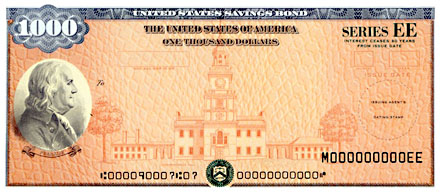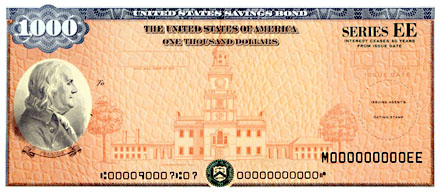
I have to give Matt Levine credit for finally promoting a genuinely interesting theory about how to overcome the debt ceiling follies. No platinum coins, no dubious constitutional workarounds, just a simple new kind of treasury bond, which he calls a premium bond.
It’s simple. When an old $1,000 bond matures, replace with another $1,000 bond that sells for $2,000. That provides the government with an extra thousand dollars. And why would anyone buy it? Because the interest rate would be really high, around 20-30 percent or so. Unless I’m missing something, this would be unquestionably legal; the  math works out fine for investors; and it provides the federal government with lots of extra money.
math works out fine for investors; and it provides the federal government with lots of extra money.
Now, as Matt Yglesias points out, whether they’re legal or not, issuing these bonds would almost certainly set off “an avalanche of litigation and uncertainty” about their status. And that might scare off investors. And as Levine points out, this is still banana republic terroritory, but “as lunatic schemes go, it gives off less of a banana-republic-from-outer-space whiff than the platinum coin does.” In other words, in the real world it’s not going to happen.
Why write about it then? Just because it’s an impressive display of human ingenuity and flexibility. It’s amazing the ideas we can collectively come up with once there’s a gun to our heads and we have to.
UPDATE: Since this isn’t going to happen, it probably doesn’t bear too much scrutiny, but as I was eating breakfast I got to wondering about the “unquestionably legal” part of this. If you sell it for $2,000, does that mean it’s a $2,000 debt no matter what denomination you put on the bond itself? I’m not sure! Perhaps some lawyers with idle time on their hands will weigh in on this.
UPDATE 2: A reader emails:
The amount of debt represented by any bond is the amount the bond promises to pay back, regardless of the purchase price. If the bond promises to pay $1000 at maturity, it’s $1000 of debt regardless of whether it sells for $1 or $100,000. In addition, the debt limit statute doesn’t affect the interest rate, which floats independently of the principal. The “premium bond” idea is unquestionably cockamamie, but it has no whiff of illegality about it.
Huh. Well, maybe so. I wonder what a judge would say? In any case, if this is really how it works, why even bother with the $1,000 face value? Why not issue a one mil bond that pays out a million percent interest (or whatever) and sells for $10,000? In other words, basically a guaranteed coupon with essentially no value at maturity at all. That would put the debt ceiling out of business for good.















